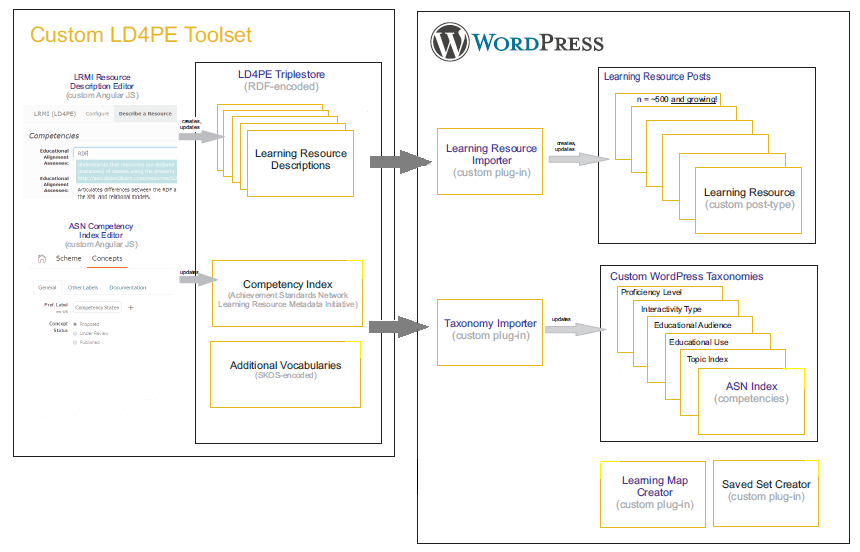Quick Links
- Documentation:
SKOS Editor: how-to guide
LRMI Editor – how-to guide
Initial goals for the LD4PE project included expectations that the tools developed to support the Explore platform would be openly available to be downloaded, installed, and adapted by others. Many learning situations can adapt and extend the central concept of cataloging learning resources against defined vocabularies, including an index of competencies important to attaining mastery within a field of study. Existing standards and tools like those of the Achievement Standards Network (ASN) and Learning Resource Metadata Initiative (LRMI) support articulation and linked data expression of learning resource descriptions across a broad range of topical disciplines. The Explore project helps to bring together those powerful conceptual components via small-footprint utilities that translate concepts to actionable steps.
Components of the Explore Platform

The Explore platform relies on five technical components to manage its dataset and render a usable public interface:
- SKOS-based Editor which creates and updates learning resource descriptions compliant with the LRMI standard, in part by referencing
- Competency Editor which manages competencies defined in compliance with the ASN standard
- RDF triplestore hosted to provide a data repository
- WordPress instance hosted to render web pages displaying data from the triplestore, as managed via the editor utilities
- Custom WordPress plug-ins that manage the transition and display of triplestore data within the WP environment:
- perform scheduled import of triplestore data to populate a custom WP post-type for each learning resource description
- build and update custom WP taxononmies for ASN competencies as well as other SKOS-based descriptors such as keyword, language, and audience.
- manage user-specific collections of resources (“saved sets”) and learning maps linking competencies in logical sequence to define an instructional arc or path
Hosting Requirements
The Explore toolset occupies a small hosting footprint with rather basic requirements:
- Triplestore: Standard support for RDF storage
- Learning resource and taxonomy editors: Both the SKOS-based and ASN editor tools are developed in AngularJS to run on a relatively standard web hosting platform.
- WordPress and custom plug-ins: This generic platform requires very standard http web server support with current PHP capabilities.
